Note from the Editors: The Bulletin of the Global Network of Psychologists for Human Rights (GNPHR) contains articles, events, news, and citations about domains where psychology and human rights intersect. Information is gathered from many sources and reflects many opinions. The goal is to stimulate reflection, discussion, and informed dialogue.The material published here does not imply that the GNPHR as a network, the GNPHR Steering Committee as a committee, or the individual subscribers share the expressed views.

February-March 2025
Table of Contents
SPECIAL COMMEMORATIVE DAYS – UN
 Special UN Days for February and March 2025 include:
Special UN Days for February and March 2025 include:
- February 6: International Day of Zero Toleration for Female Genital Mutilation – The goal of this year’s day is the UN Goal – End Genital Mutilation by 2030.
- February 20: World Day of Social Justice 2025. ‘Strengthening a Just Transition for a Sustainable Future.’ This is the idea of integrating “just transition” principles into global and national policies. When these principles are built into sustainable development agendas policymakers can create a fairer environment where the costs of change are shared equitably.
World Day of Social Justice takes place every year on 20 February. It was designated by the UN General Assembly in 2007 to remind us of the need to build a fairer and more equitable world and to urge all efforts to combat unemployment, social exclusion, and poverty.
GNPHR NEWS AND EVENTS
GNPHR Network of HR Groups in Psychology Associations
As part of its regular activities, the Network of HR Groups in Psychology Associations requests Update Reports from its members. These are posted on the Network’s web page.
 Recent Report: Human Rights at the Psychological Society of Ireland. Elaine Rogers
Recent Report: Human Rights at the Psychological Society of Ireland. Elaine Rogers
Summary
The PSI explicitly articulates that human rights are central to the work of the Society. This brief report provides some insights into the ways in which the PSI advances human rights and psychology in particular domains. There are of course many other examples and readers are welcomed to the PSI website. Human rights and psychology are deeply interconnected, placing an obligation on professional associations to recognise, foster, and leverage these connections to ensure that psychological science and practice serve the betterment of the global community. The PSI and its members endeavour to fulfil that obligation.
GNPHR Blog explains National Preventative Mechanisms
National Preventive Mechanisms and their relevance for Psychologists and Psychology – Elaine Rogers explains how the UN and states monitor detention centers to prevent abuse and torture. Psychologists are important allies in this process – read how.
Webinar Series Human Rights Education
February Webinar:
Next Webinar in April 2025
For past Webinars, see: https://humanrightspsychology.org/webinars/
CONTENT AREAS AND NEWS
General
 Researchers Under Attack: An Overview
Researchers Under Attack: An Overview
Research Support Consortium compiles sources of support for researchers facing coordinated campaigns of intimidation and harassment.
For Researchers
When your work puts you at risk for intimidation and harassment, it can feel overwhelming. But you are not alone. We offer practical suggestions for navigating conversations with your institution.
For Research Institutions
Researchers’ important work often places them at risk for intimidation and harassment. Learn how to prepare for and respond to these attacks. Toolkit for institutions: https://researchersupport.org/wp-content/uploads/2024/09/RSC_Toolkit_V2.pdf
Opinie: Bewaak de kwalitatief goede en inclusieve gezondheidszorg tegen censuur uit de VS. [Opinion: Guard quality and inclusive healthcare from US censorship.]
Sabine Oertelt-Prigione e.a., de Volkskrant, 19 februari 2025. Translation DeepL
[from the website]: The Trump administration is blazing a trail of destruction through US science with its war on ‘woke’. The consequences are also being felt in the Netherlands. In the United States, research on the role of sex and gender in health is stymied, with serious consequences. Studies are stopped, funding is withdrawn, scientists are banned from using certain words and scientific publications are withdrawn. This has a direct impact on the health of everyone, especially women and underrepresented groups.
A diverse society needs knowledge about health disparities to provide high-quality, person-centred care. Inclusive research enables healthcare providers to take into account the factors that affect the health of different groups, and thus provide tailored healthcare. This opinion piece is endorsed by more than 300 professors, researchers, healthcare providers, and other experts and stakeholders.
British Medical Journal: Medical journal editors must resist CDC order and anti-gender ideology. Jocalyn Clark, Kamran Abbasi. BMJ 2025;388:r253, 4 February 2025.
[from the website:] The news that on 31 January 2025 the Trump administration instructed scientists employed by the US Centers for Disease Control and Prevention (CDC) to withdraw or retract articles from medical and science journals is sinister and ludicrous. The instruction, from Sam Posner, the CDC’s associate director for science, said that the order was for publications that included “forbidden terms” such as gender, transgender, LGBT, or transsexual, and applies to submissions that have not been accepted yet and accepted papers that have not yet been published.
The Russian Psychological Society After 2022: Serving the State, Shaping Ideology, Weaponizing Science. Illia Poludonnyi, Valeriia Palii, Olena Gapak, KSE Institute, 17 January 2025.
KSE has released its new report on the Russian Psychological Society (RPS), the largest organization of psychologists in Russia, focusing on its activities after 2022. The study was prepared by psychologist Illia Poludonnyi and KSE experts Valeriia Palii and Olena Gapak. It highlights how the organization promotes narratives framing Russia’s war in Ukraine as “just” and “necessary” and spreads pro-military rhetoric among youth. The report also examines its collaboration with Russian authorities and sanctioned organizations.
Academic Freedom / Higher Education
The Social Foundations of Academic Freedom: Heterogeneous Institutions in World Society, 1960 to 2022
Julia C.Lerch, David John Frank, Evan Schofer, Volume 89, Issue 1.
This article analyzes academic freedom worldwide with newly available cross-national data. The literature principally addresses impingements on academic freedom arising from religion or repressive states. Academic freedom has broadly increased since 1945, but we see episodic reversals, including in recent years. Conventional work emphasizes the uniformity of international institutional structures and their influence on countries. We attend to the heterogeneity of international structures in world society and theorize how they contribute to ebbs and flows of academic freedom. Post-1945 liberal international institutions enshrined key rights and norms that bolstered academic freedom worldwide. Alongside them, however, illiberal alternatives coexisted. Cold War communism, for instance, anchored cultural frames that justified greater constraints on academia.
Crimes against humanity
80 Years after the liberation of Auschwitz: Remember, Learn, Act.
This webinar featured an interview with Dr. Kathrin Meyer, Secretary General of IHRA (International Holocaust Remembrance Alliance) and video testimony by Olga Lengyel, who authored one of the first public accounts of Auschwitz, Five Chimneys: A Woman Survivor’s True Story of Auschwitz.
Online Webinars are available to view on TOLI’s website, where you will also find information about the 2025 programs for educators and more.
Financing Plantations and Slavery. Dutch credit in Essequibo, Demerara and Berbice, 1770-1820.
Paul Richard Stephan Koulen, Erasmus University Rotterdam, January 2025
[from the website:] This study addresses the productive and demographic expansion of colonial Guyana’s plantation economy at the end of the eighteenth century and the role of Dutch credit… Dutch credit is traced in Guyana from 1740 but is prominent during the years 1769-1777 and 1790-1800. Contrary to suggestions in Guyana’s historiography, the study finds no support for significant British credit during the period 1770-1820.
Methodologically, the study examines mortgage deeds registered in Essequibo, Demerara and Berbice between 1770 and 1800, and secondary sources for mortgages prior to 1770 and during 1800-1820. Dutch credit was secured by plantations and enslaved persons as collateral, or mortgage-backed plantation credit (MBPC), a forerunner of mortgage-backed securities (MBS). In the 18th century this type of Dutch credit adopted a common model, whereby Dutch merchant firms created early modern investment funds, or so-called “negotiaties”. These funds raised capital by issuing bonds to the public. The funds, in turn, supplied credit for purchasing enslaved persons and plantation requirements. Plantation-owners, as mortgagors, shipped products to mortgagees to repay capital and pay interest. Dutch plantation credit therefore revolved, whenever products were remitted to creditors.
Capital transfers took place only in the Dutch Republic, as payments to merchants shipping enslaved persons, payments to merchants supplying plantation requirements, and payments of insurance premiums for cargoes of tropical products sent by plantation owners as remittances.
Decolonization / Indigenization
Decolonising Existential Philosophy: Considering disciplinary decadence within Western existential thought.
N. Fraser, Existential Analysis: Journal of The Society for Existential Analysis, 35.1.
Existential philosophy is an infinite conversation across time and space, yet why are some voices idolised whilst others are exiled? This paper explores the encompassing phenomenon of colonialism through the lens of disciplinary decadence, advocating a paradigm shift away from a culture of exclusion and denial.
Democracy and Human Rights
The Logic of Destruction And how to resist it.
Timothy Snyder, February 2, 2025.
What is a country? The way its people govern themselves. America exists because its people elect those who make and execute laws. The assumption of a democracy is that individuals have dignity and rights that they realize and protect by acting together
The people who now dominate the executive branch of the government deny all of this, and are acting, quite deliberately, to destroy the nation. For them, only a few people, the very wealthy with a certain worldview, have rights, and the first among these is to dominate.
For them, there is no such thing as an America, or Americans, or democracy, or citizens, and they act accordingly. Now that the oligarchs and their clients are inside the federal government, they are moving, illegally and unconstitutionally, to take over its institutions.
The parts of the government that work to implement laws have been maligned for decades. Americans have been told that the people who provide them with services are conspirators within a “deep state.” We have been instructed that the billionaires are the heroes.
All of this work was preparatory to the coup that is going on now. The federal government has immense capacity and control over trillions of dollars. That power was a cocreation of the American people. It belongs to them. The oligarchs around Trump are working now to take it for themselves.
Democratic Systems and Psychological Science: A Collective Statement and Call to Action by the Global Psychology Alliance in support of psychology and psychologists in contexts of constrained social and political freedom
Global Psychology Alliance, 2025.
CALL TO ACTION: As global psychologists and psychology associations committed to the well-being of individuals and communities, the undersigned members of the Global Psychology Alliance (GPA) recognize the profound impact of social and political determinants on mental health. The GPA calls upon our fellow psychologists worldwide to advocate for the protection and promotion of democratic systems as a means to enhance health globally. Let us use our expertise to educate communities, policymakers, and leaders about the critical link between democratic systems and mental health and to stand against anti-democratic forces that threaten the well-being of individuals and their associations. By doing so, psychological science and applications embrace the aspiration of societies where all persons have the opportunity to thrive, free from the psychological distress caused by corruption, violence, and oppression. The Global Psychology Alliance is united to support actualized democratic systems as a political ideal and a fundamental pillar of mental health and human flourishing.
Displaced/Migrants/Refugees/Stateless
Psychological Science and Immigration Today
APA TASK FORCE ON IMMIGRATION AND HEALTH. August 2024.
This report updates the 2012 American Psychological Association (APA) report, Crossroads: The Psychology of Immigration in the New Century.
Part 1 describes changes to the context of immigration in the United States since the seminal Crossroads report, reviewing trends in the foreign-born population in the United States, including countries of origin, legal statuses, and the social, political, and cultural context of their reception.
Part 2 begins with a brief historical review of the discriminatory immigration policies in the United States before segueing to address recent innovative advances in relevant psychological science and conceptual approaches since the Crossroads report. Authors pay particular attention to areas that have dominated the last decade of scholarship related to immigrant health in the United States, namely, the socioecological model, intersectionality, a population health framework, social and cultural determinants of health lenses, decolonial and liberation approaches, attachment theory, and trauma scholarship. They incorporate individual, communal, and societal factors, stressing how these intersecting levels of analysis impact immigrant health.
Human Rights Education
Countering Holocaust Distortion
A capacity building training program to be used by training professionals in both governmental and civil society sectors.
Why address Holocaust distortion?
Holocaust distortion is an attack on truth and knowledge. It spreads antisemitism and prejudice and jeopardizes the understanding of this genocide. The International Holocaust Remembrance Alliance (IHRA) partnered with the United Nations Educational, Scientific and Cultural Organization (UNESCO) to develop this practical training program to help policymakers, educators and civil society to understand what it is, why it is harmful, and how to counter it.
Inclusion, Exclusion, Racism
Differential associations between race-based traumatic stress and major, everyday, and vicarious racial discrimination among young adults of color
Genevieve Alice Woolverton, Tiffany Yip, Ritika Rastogi, Hyeouk Chris Hahm, Cindy H. Liu, 5 February 2025
Race-based traumatic stress (RBTS) is a psychological response to racial discrimination among individuals with marginalized racial/ethnic identities, but the literature about how different forms of racial discrimination contribute to RBTS is lacking. We compared the effects of major, everyday, and vicarious racial discrimination on RBTS and evaluated the associations between ethnic–racial identity (ERI) and RBTS. Analyses used cross-sectional survey data from Black, Asian, and Latine young adults (N = 1,342, Mage = 25.9 years) collected in 2022. Demographic variables; major, everyday, and vicarious racial discrimination; ERI commitment and exploration; and RBTS were assessed. Hierarchical multiple regression was used to identify correlates of RBTS. Everyday, β = .37, p < .001; vicarious, β = .16, p < .001; and major racial discrimination, β= .16, p = .004, predicted RBTS. Neither ERI commitment nor ERI exploration was significantly associated with RBTS. Race did not moderate the associations between major, everyday, or vicarious discrimination and RBTS, highlighting that Black, Asian, and Latine young adults appear to be equally at risk. As most vicarious racial discrimination and RBTS research has focused on Black samples, we expand the literature by including Latine and Asian young adults. Our observation that vicarious racial discrimination was a similarly strong predictor of RBTS compared to everyday and major racial discrimination underscores the importance of its inclusion in research focused on discrimination and mental health. Taken together, clinical assessment should focus on questions related to diverse experiences of racial discrimination for individuals with marginalized racial identities.
Trump’s white refugees.
Africa is a country
I was stepping out of the subway in Brooklyn on Friday night, February 7, when I got a notification on my phone that US President Donald Trump had signed an executive order “sanctioning” South Africa, halting all aid to the country.
The New York Times reported that the order cites South Africa’s recent land expropriation law, which Trump claims unfairly targets white South Africans, especially Afrikaners. The order also elevates Afrikaners to the position of “refugees” that Cubans who oppose their government enjoy in the US. As one white South African friend quipped on WhatsApp, Trump is: “Deporting actual refugees for the white supremacist conspiracy theory refugees.” The executive order also made clear that South Africa’s case against Israel for genocide at the International Court of Justice was a major justification for the aid embargo. Of course, there is no truth to the claims Trump makes. As the Times reminds its readers, despite making up only 7% of the population, white South Africans still control (read: own) vastly disproportionate amounts of land—a legacy of apartheid.
Eliminating The Scourge Of Racism, Prejudice Remains Unfinished Business
Prof. Saths Cooper | February 11 2025
ANC leaders Nelson Mandela and Winnie Nomzamo Madikizela greeted thousands of South Africans at the Cape Town City Hall following his release from the Victor Verster prison, February 11, 1990. Today marks the 35th anniversary of his release.
During Madiba’s tenure – which ended in 1999, two days before the epochal June 16 uprising – we anticipated the end of racism, sexism, violence, tribalism, sectarianism, division, and a host of other ills inherited from our terrible colonial and apartheid past, says Prof. Saths Cooper.
While Nelson Rolihlahla Mandela was publicly forgotten on the 11th anniversary of his death on 5th December 2024, the 35th anniversary of his release today, after 27 years in apartheid jails, will not suffer the same fate.
Our fledgling democracy’s founding president will be jointly celebrated by the museum that bears his name in the Eastern Cape, the Iziko Museums (founded in 1825), and Robben Island – where he was imprisoned for most of those years – at the Nelson Mandela Gateway (part of the Robben Island Museum), at Cape Town’s Waterfront.
South Africa and the world were in a euphoric mood 35 years ago, following Madiba (as he wished to be called) as he walked out from Victor Verster Prison, outside Paarl, hand-in-hand with Winnie Nomzamo Madikizela, and a retinue that included our current president Matamela Cyril Ramaphosa and the irrepressible Archbishop and Nobel Peace Laureate Desmond Mpilo Tutu, who Madiba on 23 June 1999 described as a “fearless fighter against the evil and inhuman system of apartheid… renowned for selfless commitment to the poor, the oppressed and downtrodden… His most characteristic quality is his readiness to take unpopular positions without fear.”
Mental Health and Human Rights
HHRI Newsletter: https://www.hhri.org/news/
Boletín No. 1 Febrero 2025
Baluchistán: violaciones de los derechos humanos, estigma social, salud mental y crisis de suicidios.
[English: Newsletter No 1 – Februar 2025 – Balochistan: Human Rights Violations, Social Stigma of Mental Health and the Suicide Crisis.]
Persons with Disability
Locked out of decent housing, disabled residents in France struggle for dignity
Lara Bullens, France24, February 7 2025.
For people with disabilities in France, finding accessible housing is particularly challenging. From emergency shelters unfit for mobility needs to social housing failing wheelchair users, the housing crisis hits disabled residents hardest and pushes many to the brink, as revealed in a new report by the Foundation for Housing the Disadvantaged.
Voices Against War
Middle East
Women
Italian police accused of making female activists remove underwear and do squats
Angela Giuffrida, in Rome, The Guardian, 15 January 2025.
Climate activists say they were subjected to degrading treatment during questioning in Brescia on Monday.
Italy’s interior minister has been urged to open an investigation into police in the northern city of Brescia amid allegations that seven female climate activists were made to take off their underwear and perform squats during questioning.
The activists were among 22 people brought to Brescia’s main police station on Monday morning after officers interrupted a protest held outside the Italian aerospace and defence firm Leonardo’s factory.
‘Solar Mamas empower our people by giving them electricity’: the women lighting up Zanzibar
Carlos Mureithi, Unguja, The Guardian, 15 Jan 2025.
[from the website:] Women with little to no formal education trained to become solar technicians, transforming villages and tackling patriarchal norms. In a dimly lit corridor of a mud-walled house nestled among coconut trees, Sharifa Hussein stripped red and black cables, a screwdriver voltage tester balanced between her lips and rolls of cable lying by her feet. Then, with the help of three other women, she attached the two wires to an electronic device nailed on the wall. The women, all dressed in colourful hijabs, were installing solar power to a house in Muyuni B village in Unguja, the main island in the semiautonomous archipelago of Zanzibar, which lies off the coast of Tanzania in east Africa. They are part of a larger group – known fondly as Solar Mamas – who assemble, install, repair and maintain solar power kits in villages across the archipelago. They receive training from a community-based organisation called Barefoot College Zanzibar.
Only about half of the nearly two million people in Zanzibar have access to electricity – in part because of high connection costs and, in some areas, a lack of access to the power grid.
PUBLICATIONS
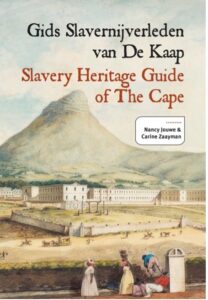 Slavery Heritage Guide to the Cape
Slavery Heritage Guide to the Cape
Nancy Jouwe & Carine Zaayman (eds.),LM Publishers, 2025.
In present-day South Africa, the focus within political and cultural institutions is primarily on grappling with the effects of apartheid. Even though apartheid formally ended in 1994, it continues to fundamentally shape South African society, as can be noted in the inequality that still determines so many aspects of people’s lives, including land ownership, access to employment and civil infrastructure to name but a few. Due to this centrality of apartheid’s legacy, there is perhaps less of a collective appetite to engage with pasts that go further back in history. Moreover, the Dutch colonial influence is often imagined to be limited to what is today the province of the Western Cape. And yet, to understand and dismantle the thinking that made apartheid possible, it is necessary to situate it in relation to the historical trajectories that brought it into being. Notions of racial hierarchies, the privileging of trade and the exploitative labour that enables it all stem from the world that colonialism brought into being. If working towards a more just and equal South Africa entails undoing apartheid, it also means addressing its roots.
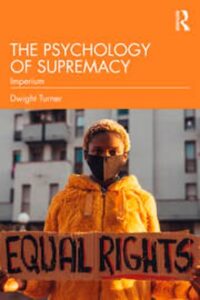 The Psychology of Supremacy: Imperium Paperback
The Psychology of Supremacy: Imperium Paperback
Dwight Turner, Taylor & Francis Ltd, 2023.
The Psychology of Supremacy brings a developmental, philosophical and psychological lens to understanding the systems embedded within the socially constructed aspects of our intersectional identities. Offering a philosophical understanding of supremacy and its meaning within counselling and psychotherapy, the book examines just how and why supremacy exists, some of the psychology behind supremacy, and how it impacts clients, training, and practice. Chapters offer means and ways of observing and challenging systems of supremacy as they may appear within counselling and psychotherapy relationships. Featured psychotherapeutic case studies detail stories from participants who have endured the painful experience of being involved in the power structures of supremacy.
A must read for psychotherapists and counsellors, this book will also appeal to psychologists, social workers, qualitative and quantitative researchers, and anyone else interested in further deepening their understanding of supremacy, privilege, and otherness.
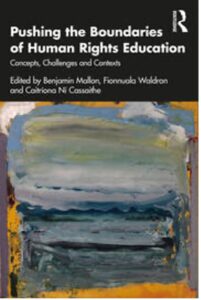 Pushing the Boundaries of Human Rights Education. Concepts, Challenges and Contexts.
Pushing the Boundaries of Human Rights Education. Concepts, Challenges and Contexts.
Benjamin Mallon, Fionnuala Waldron, Caitríona Ní Cassaithe, Copyright 2024, Routledge.
This book pushes the theoretical boundaries of human rights education, engaging with complex questions of climate-related injustices, re-imagining education through a decolonising lens, and problematising the relationship between rights and responsibilities.
It presents international studies of HRE in varied contexts (e.g. Uganda, Japan, Ireland) to explore the views and experiences of children who identify as human rights defenders, initial teachers’ understandings of concepts such as teacher agency in conflict-affected settings, and the barriers to children’s political agency. The book also highlights HRE in practice including participatory research with very young children as co-researchers and realising rights through play pedagogies, creative writing approaches and picturebooks. An HRE lens is also brought to bear on emerging subjects such as relationships and sexuality education and well-being.
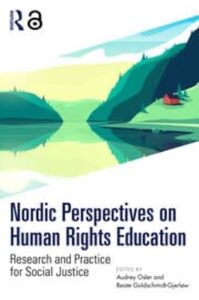 Nordic Perspectives on Human Rights Education. Research and Practice for Social Justice.
Nordic Perspectives on Human Rights Education. Research and Practice for Social Justice.
Audrey Osler, Beate Goldschmidt-Gjerløw (Eds), Routledge, 2025.
Backed by a range of case studies and recent developments in human rights education research, Nordic Perspectives on Human Rights Education guides readers through an analysis of educational inequities and identifies how internationally agreed-upon human rights standards may inform social justice practices within schools.
In an age characterised by authoritarianism and extremism, but also social and climate justice movements, this book provides a critical analysis of current practice within schools. Contributing authors also discuss how a human rights framework may improve practice, supporting intersectional thinking and more sustainable learning environments, while also empowering teachers to confidently navigate issues of gender, national identity and minority rights.
 The left after Trump. Thomas Piketty & Michael Sandel, The New Statesman, 22 January 2025. In an age of rampant inequality and oligarchic government, two leading thinkers ask: can democratic socialism survive?
The left after Trump. Thomas Piketty & Michael Sandel, The New Statesman, 22 January 2025. In an age of rampant inequality and oligarchic government, two leading thinkers ask: can democratic socialism survive?
The American philosopher Michael Sandel and the French economist Thomas Piketty are among the world’s most influential political thinkers. In their writing on inequality and the moral limits of markets, both are critics of the neoliberal order that has governed the West for the past few decades, and of the capitalist system that has facilitated the savage iniquities of the global economy. In May 2024, they met at the Paris School of Economics. The US election was six months away, but the spectre of Trump was present throughout the conversation between the two thinkers.
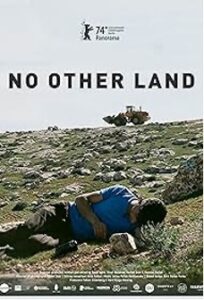 No Other Land
No Other Land
This documentary made by a Palestinian-Israeli collective shows the destruction of the occupied West Bank’s Masafer Yatta by Israeli soldiers and the alliance which develops between the Palestinian activist Basel and Israeli journalist Yuval.
 Artificial Intelligence
Artificial Intelligence
Redefining the Future of Psychology. APA, 2025
Artificial intelligence is rapidly revolutionizing psychology, unleashing a wave of innovation that redefines research, clinical practice, and education. Learn how to harness this groundbreaking technology to amplify our impact like never before!
APA policy statement (August 2024), https://www.apa.org/about/policy/statement-artificial-intelligence.pdf
RESOURCES
Academia Mental Health and Well-Being, an open-access journal broadly disseminated within the global Academia.edu network, is seeking research in Human Rights and Mental Health. Articles published with Academia.edu Journals get 4.6x more downloads after one week of publication, compared to other leading open access journals. Published articles will be disseminated to the relevant audience within Academia.edu’s 260 million researchers.
Submit an article
UPCOMING EVENTS
Tuesday, 25 March 2025 (13:00 to 14:30 CET)
Virtual Global Launch of the WHO Guidance on Mental Health Policy and Strategic Action Plans,
Register now for the virtual launch event here
Join Dr. Tedros Adhanom Ghebreyesus, Director-General of WHO, government policy makers and experts for this landmark event presenting the latest WHO guidance, designed to transform mental health policy and systems globally.
This updated guidance marks a critical step in supporting countries to develop their mental health policies and strategic action plans that meet today’s challenges. Incorporating lessons learned over the past 20 years, it offers practical guidance and tools to strengthen governance, enhance service delivery, and build a skilled mental health workforce.
Recognizing that mental health is shaped by social and structural factors—such as poverty, housing, education, and employment—the guidance outlines actionable approaches to address these determinants, eliminate barriers like stigma and discrimination, and improve access to holistic, rights-based care. It champions the participation of people with lived experience at all levels of mental health reform, acknowledging their vital role in shaping systems that are inclusive, empowering, and responsive to their needs. The guidance also emphasizes collaboration across sectors to deliver holistic support, integrating physical, psychological, social, and economic interventions, alongside efforts to prevent mental health conditions and promote well-being for all.
The 90-minute virtual event will include: An introduction to the guidance and its key components; Reflections from Ministers of Health and other stakeholders; Discussions on advancing effective, equitable, and sustainable mental health reform.
The International Council of Psychologists 83rd Annual Conference
JOIN the International Council of Psychologists in Rotterdam, Netherlands for its 2025 Annual International Conference!
This vibrant conference will celebrate ICP’s mission to support Human rights, Dignity, and Justice: Social Inclusion and Migration
Location: Rotterdam, Erasmus University College
Registration and Information: https://icpweb.org/icp-annual-conference/icp2025/
Sign up for pre-conference workshops – April 3, 9am – 12pm




Convening the global sustainability community. 6–19 June 2025, Istanbul Congress Centre, Türkiye.
The Global Sustainable Development Congress brings together the world’s leading thinkers, policymakers and actors from different sectors to drive new alliances and create positive action for a more sustainable future. Over four days, keynote speakers, panellists and representatives from our track and global content partners will share their insights on health, sustainable cities, clean energy, AI, gender equality, the environment and much more.
 Psychology Day 2025 – April 24, 2025
Psychology Day 2025 – April 24, 2025
Psychology Day at the United Nations will be on april 24, 2025. The theme for the 18th annual Psychology Day is “From Crisis to Growth: Psychological Contributions to Building Global Resilience“
CONTACTS: Published by the Global Network of Psychologists for Human Rights – www.humanrightspsychology.org
Disclaimer: The website of the Global Network of Psychologists for Human Rights (GNPHR) contains articles, events and news about the domain where psychology and human rights intersect. The information presented in this Bulletin, does not imply that the GNPHR shares the views and beliefs in the articles.
- @GNPHR1
- How to get involved – read how you can contribute to the global network
- Consider contributing a Blog/Commentary
- News and Bulletins from the GNPHR – Subscribe to GNPHR
- Email addresses:
Ways to Participate in Global Network Activities
- Share Your Experiences and Examples
One of the best ways to illustrate the intersection of psychology and human rights is through example. We are looking for examples of your encounters with human rights issues in your professional life. You might describe a time when you protected (or failed to protect) human rights, or advocated for what you saw as a human rights issue. The events might be in your clinical, research, academic, applied, or volunteer work. Please send your narrative / story (500-1000 words) to Marlena Plavšić (marlena_plavsic@hotmail.com). We will compile these for publication in the GNPHR Bulletin and on the website. Please also indicate if you would like your stories to remain anonymous. - Share your Expertise and Opinions
We invite you to contribute a blog or opinion piece on general human rights issues; human rights education or strategies for raising the profile of human rights within psychology or your professional life. Students are welcome to contribute, including on student needs for learning about and addressing human rights. Please contact the GNPHR Blog editor (blogeditor@humanrightspsychology.org) with ideas for the article you would like to write! - Send articles/news/events
If you come across a human rights article or news, or know of an upcoming hunman rights event, please send for publication in the Bulletin. Send to the Bulletin editor Polli Hagenaars (polli.hagenaars@gmail.com).

